KNOW

THE NEW CROP
Agribusinesses Feeding the Economy

From the CEO
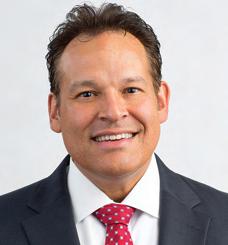
Agribusiness encompasses the industry and activities involved in the production, processing, and distribution of agricultural products. It includes everything from farming and food processing to the supply of agricultural inputs and services. Since its founding, Sullivan County has been home to diverse agribusinesses. Today, it is a key economic driver, representing hundreds of millions in annual sales and several thousand jobs.
From farm to table—supplying local stores and restaurants—as well as large-scale food processors, Sullivan County agribusiness is thriving and expanding every year. Companies such as La Belle, Hudson Valley Foie Gras, Murray’s Chicken, Nonni’s, Formaggio Cheese, Deb El, Catskill Mountain Sugar House, Hilly Acres Farm, Seminary Hill Cidery, Tonges Dairy, and Cochecton Mills—along with a growing number of breweries and distilleries—make up a significant portion of this sector. These businesses produce, enhance, and distribute poultry, dairy, snacks, maple syrup, spirits, beer, feed, and much more. Products are shipped across the country and even overseas—all from right here in Sullivan County.
As more attention is paid to where and how our food is grown and processed, this sector will continue to grow.
This edition highlights agritourism, tax incentives, green farming practices, workforce management, technological advancements, sustainability, and more. The Partnership’s efforts to diversify our tourism-based economy are strongly supported by the growth and resilience of agribusiness. With its variety, far-reaching impact, and value-added potential, agribusiness has supported Sullivan County’s economy for generations—and continues to expand today.
As always, we deeply appreciate the continued support of our members and your trust in the Partnership to positively impact our business community and local economy. I encourage you to thank our dedicated staff—Jen Cassaro, Vanessa McPhillips, and Amaya Fernandez—who work hard to produce this award-winning publication. Please reach out with any topics you’d like us to cover in future editions. Every opportunity to learn more about the challenges and opportunities facing our business community benefits us all.
Thank you again for all you do for the Partnership for Economic Development in Sullivan County.
With sincere appreciation,

Chief Executive Officer










Agribusiness in Sullivan County: Rooted in Tradition, Growing Toward the Future
by Michelle Proscia, CCE Sullivan Ag Production Program Manager
Sullivan County’s agricultural landscape is as diverse and resilient as the people who farm it. With 367 active farms spanning nearly 59,000 acres, agriculture continues to play a vital role in the county’s economy, culture, and community identity.

From long-standing dairy and poultry operations in northern part of the county to emerging specialty farms producing value-added products, maple syrup, vegetables, orchards, pasture-raised poultry, heritage meats, cut flowers, craft beverages, and mushrooms, our county represents the full spectrum of modern agribusiness. These farmers show that innovation and sustainability go hand in hand, while generational farms remind us of our deep farming roots. Our agricultural community is not only feeding the region—it’s fueling economic resilience, job creation, and rural revitalization.
In recent years, Sullivan County has seen a rise in agritourism and agribusiness. The options are wide-ranging, including farm tours, U-Pick, CSA’s, Farm Markets, Farm Stays, Farm-to-table events, agricultural events and festivals, and many more businesses.
The future of agribusiness in Sullivan County is promising. With growing consumer interest in transparency, sustainability, and local sourcing, our producers are uniquely positioned to lead. At the same time, challenges like aging infrastructure, labor shortages, climate stress, and zoning regulations remain real hurdles.
Cornell Cooperative Extension is actively working to:
• Build next-generation and beginning farmer capacity through mentorship and youth programs
• Increase access to farmland and farmland protection tools
• Connect farms to emerging markets
• Expand agritourism and value-added opportunities
• Address risk and emergency management
With continued investment and collaboration, Sullivan County can serve as a model for resilient, diversified rural economies powered by agribusiness.
As the agricultural sector faces challenges—from rising costs to unpredictable weather—CCESC remains committed to equipping producers with the knowledge and resources they need to thrive. Whether you’re a multi-generation dairy family or a first-generation flower grower, Sullivan County is a place where agribusiness can grow and thrive.
About CCE - Your Trusted Resource of Choice.
Cornell Cooperative Extension Sullivan County puts a wealth of useful, science-based information at your fingertips! They offer free or low-cost workshops on topics that range from how to start raising chickens in your backyard to writing a business plan. There are full scholarships available for many of their programs! Explore resources, check out upcoming events, call or visit their Extension Education Center to learn more.
Growing Smarter: How MTEC Helps Agribusinesses
in Sullivan County Thrive
by Charles Walwyn, Business Development Manager

In Sullivan County’s rolling hills and fertile valleys, agriculture isn’t just tradition, it’s the backbone of the local economy. From heritage dairy farms and artisan cheesemakers to emerging hemp processors and beverage startups, the region’s agribusinesses seamlessly blend a rich agricultural history with significant future potential.
Yet, as markets evolve and consumer expectations rise, even seasoned producers face fresh challenges. Issues like persistent labor shortages, escalating energy costs, increasing regulatory requirements, and the rapid pace of technological advancements demand new and innovative strategies. Recognizing this crucial need, the Manufacturing and Technology Enterprise Center (MTEC) bridges the gap, bringing modern, practical solutions to one of New York’s oldest and most essential industries.

“We help local agribusinesses reach their next level—whether it’s automating a production line, obtaining a food safety certification, or streamlining packaging processes,” says Phyllis Levine, Director of Growth & Engagement at MTEC.
Innovating for the Future
For many small and mid-sized agricultural businesses, accessing new technologies can seem daunting, especially when they lack extensive internal resources. MTEC provides a clear path
forward, assisting farmers and food manufacturers in exploring, adopting, and seamlessly integrating technological solutions tailored specifically to their unique operations.
MTEC’s comprehensive technology support includes:
• Smart sensors and automation planning
• Prototyping and product development
• Digital workflow assessments
• Automation readiness guidance
Leaner, Cleaner, and More Competitive
One popular and impactful service MTEC provides is lean manufacturing assessments. These assessments meticulously identify inefficiencies and operational bottlenecks, guiding businesses to optimize their processes. From significantly reducing downtime in food processing lines to cutting energy consumption in greenhouse operations, lean practices enhance profitability and sustainability.
Simplifying Food Safety
Ensuring food safety compliance is critical, whether businesses are selling products locally or aiming for export markets. MTEC expertly assists agribusinesses in navigating complex food safety regulations such as FSMA (Food Safety Modernization Act), HACCP (Hazard Analysis Critical Control Points), and SQF (Safe Quality Food), among others. MTEC provides customized training programs, mock audits, and thorough documentation support, greatly simplifying compliance.
The substantial benefits of this support include:
• Expanded market access opportunities
• Increased confidence among buyers
• Stress-free, efficient audit preparation
Strengthening the Local Workforce
Agriculture continually faces challenges related to labor shortages and skills gaps. To address
these persistent workforce issues, MTEC proactively partners with regional educational institutions, including SUNY Sullivan and local BOCES programs. Together, they provide targeted workforce training in critical high-demand areas such as food safety management, specialized equipment maintenance, and essential leadership skills.
Through thoughtfully designed workshops, apprenticeship programs, and practical on-the-job training, Sullivan County employers can build and retain skilled teams. These initiatives substantially enhance local business capabilities, supporting economic stability and growth throughout the broader community.
Funding Innovation and Expansion
MTEC’s support extends beyond strategic consulting; it plays a crucial role in facilitating business growth by connecting local agribusinesses with essential funding resources. Whether it involves securing energy efficiency grants or obtaining low-interest loans for specialized equipment purchases, MTEC helps make vital innovations and expansions financially achievable and accessible.
Real Impact in Sullivan County
The tangible impacts of MTEC’s contributions resonate clearly across Sullivan County, positively influencing a variety of agricultural enterprises:
• A local cheesemaker is actively exploring the implementation of smart sensors and automation systems within their production lines.
• An innovative entrepreneur collaborates closely with MTEC’s experienced engineering team to develop thermal retention prototypes, enhancing product quality and sustainability.
A regional metal fabricator achieved remarkable productivity gains while significantly reducing waste, directly benefiting their agricultural clientele.
Each success story is unique, yet the outcomes consistently align: creating sustainable, resilient, and profitable local businesses prepared to meet the evolving demands of modern agriculture.
Growing Together
As the agricultural landscape continues to evolve, businesses must proactively adapt to remain competitive. MTEC is fully dedicated to guiding local agribusinesses toward meaningful innovation, sustained success, and reliable growth—one practical, achievable project at a time.

To learn more or schedule a consultation contact: Charles Walwyn Business Development Manager 845-391-8214 ext. 3018 charles.walwyn@mfgtec.org www.mfgtec.org
About MTEC
MTEC operates as part of the national Manufacturing Extension Partnership (MEP) network, a valuable program under the U.S. Department of Commerce’s National Institute of Standards and Technology (NIST). It delivers affordable, high-impact consulting, specialized training, and technical assistance specifically designed for small and medium-sized manufacturers across New York’s Hudson Valley region, including Sullivan County.







Agribusinesses: Alive, Well, and Thriving in Sullivan County
SPOTLIGHT ON SOME OF THE PRODUCERS:

Hilly Acres Farm
Jeffersonville, NY
Owned by the Hahn family
Specializing in Pasture raised Beef, Pork, Poultry, Turkeys and Lamb
ORIGINS
Andy’s Hahn’s dad Gene grew up on what was referred to as the home farm on Sander Rd. Gene and his siblings were orphaned when they were very young, and their Uncle Jake took them in and raised them. For Gene, it was where he grew up. In 1955, Uncle Jake decided to sell the farm. Tanya’s parents had immigrated to this country from Europe after WW II and after spending about 5 years in Patterson, NJ, moved north and bought the farm from Uncle Jake. After college, she moved back home and would eventually meet and marry Andy Hahn-Gene’s son. The joke is that Andy married her just to get the farm back!! Both of their sons spent their childhood on the farm, but Michael developed a passion for farming. He

was very involved in 4-H, and decided to go to SUNY Cobleskill where he earned both 2- and 4-year degrees in Ag Economics and Animal Science. That experience helped him to make the decision to move away from traditional farming and explore direct marketing and production. He had fresh ideas and understood the science behind the well-being of livestock.
They started direct retail part time in the mid 2000’s and then went full-time in 2010. The original family farm was a dairy, and it was idle for about 15 years, until Michael graduated college, at which point the farm established a direct marketing model moving away from traditional dairy.
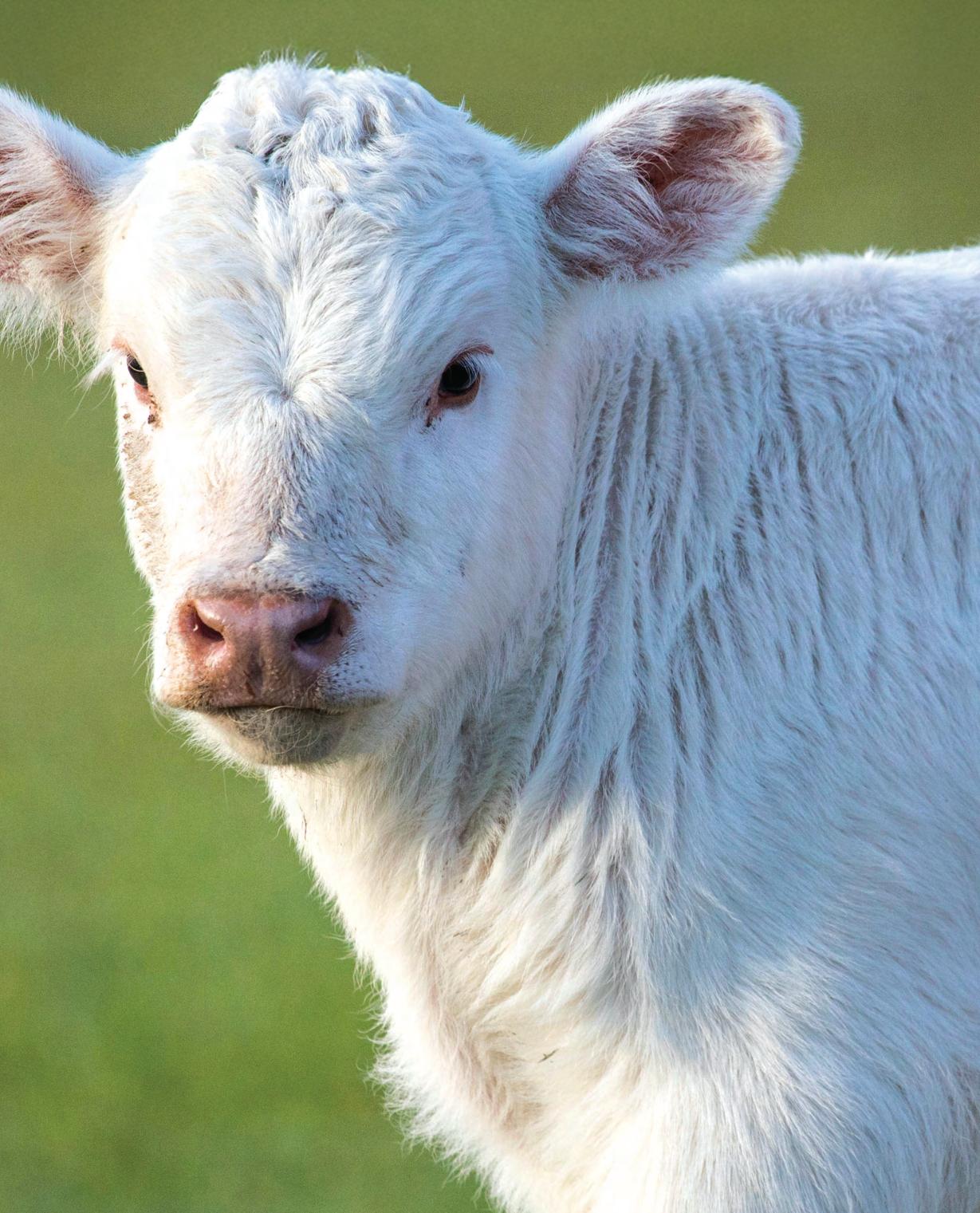
GROWTH
The Hahn family enjoys positive feedback from customers about the quality of their products and they attribute their success to keeping livestock healthy and comfortable and having consistent quality products.
“The animals take a lot of monitoring, says Tanya Hahn, “We observe their behaviors. Are they eating and drinking well? Are they comfortable? The key is to reduce any type of stress. We want them to simply live well.”
The Hahn’s have used Dr. Joe Nebzydoski-Youngsville Vet Clinic forever. “He’s extremely knowledgeable and frank. We’re fortunate to have him particularly on the western side of the county.”
What makes you stand out from your competition? Reliability and consistency. We raise everything that we sell, so there’s no brokered products.
COMMUNITY & ECONOMIC IMPACT
Agriculture has a decent multiplier effect on the local economy. Small farms likes theirs provide wholesome products, spend at local businesses, hire local labor, and provide unique land lease opportunities for larger property owners.
CHALLENGES
High equipment costs and lack of reliable meat processing facilities. They also struggle with access to fair pricing for their products. Commercial ag (feedlots) have a much higher efficiency, resulting in lower cost to the consumer at the expense of quality.
GOVERNMENT SUPPORT
The Hahn’s would like to see more funding and technical support for more local processors. A local ag friendly land grant program would facilitate the purchase of more acreage for production and grazing.
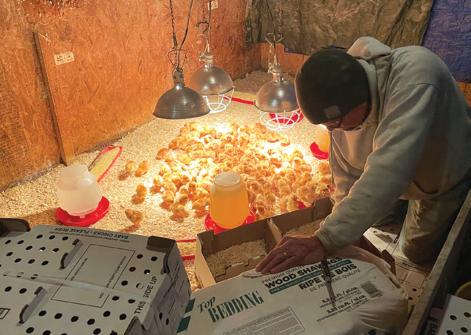
BUSINESS OPERATIONS
Hilly Acres sells their products direct and at Farmer’s Markets locally. Marketing and Branding are word of mouth, online and Facebook. They also place a very high importance on sustainable practices. The farm employs rotational grazing, and continuous soil testing.
PERSONAL PERSPECTIVE
“Farmers aren’t respected as professionals, and the general population does not realize how fragile our food supply is.” says Tanya, “The pandemic was a perfect example. Unfortunately, most have gone back to not respecting where their food comes from, and how hard it is to get it to the consumer. We all utilize an attorney, accountant, or doctor in our lifetime, but we rely on farmers 3 times a day every day.”
She would encourage the next generation to go into farming because “NO FARMS NO FOOD.”
ADVICE FOR NEW FARMERS
Get an education and learn about changing farm practices, ag economics, animal husbandry, the list is endless.
Murray’s Chicken
5790 Main Street, South Fallsburg, NY 12779
Owned by Murray
Bresky
Specializing in Broiler Chickens murrayschicken.com

GENERAL BACKGROUND
Murray Bresky was born and raised in South Fallsburg, NY and has spent the better part of eight decades in the poultry business connecting with incredible folks across the industry, learning from them, and better understanding what it takes to produce not only a high-quality, great-tasting bird, but to build a company that cares about more than just the bottom line.
In 1992, he founded Murray’s Chicken. He started this company because he saw where the industry was headed. More and more, the food business — and the poultry sector in particular — was being dominated by mega-corporations focused solely on their profit and loss statements, often at the expense of quality, transparency, and care for their communities.
Murray’s Chickens are raised in the rolling hills of Southeastern Pennsylvania. The birds are processed in South Fallsburg, NY. By partnering with a select number of family farms, Murray’s helps to strengthen local economies and protects small farmers by allowing them to focus solely on the exceptional quality and taste of the Murray’s Chickens they grow. Many of their growers/ partners are from families that have grown livestock and crops on their lands for many generations. Their growers are passionate about their birds and are committed to raising the highest quality poultry. Unlike many others in their industry, Murray’s Chickens is family-owned –their commitment is to great tasting, healthy chicken not to shareholder demands.

Murray’s Chicken currently employs over 300 team members at its South Fallsburg facility. They attribute their growth and success to having the right management personnel in the “right seats on the bus”. It is a family atmosphere where they celebrate and continued...
support employees who buy homes in the community and send their children to college.
COMMUNITY & ECONOMIC IMPACT
Murray’s annual payroll ($19.5MM) has an exponential impact on local economic development. Additionally, they are supportive of various local organizations (Sullivan County Federation for the Homeless, various religious groups, local fire departments and other charitable organizations). They provide products for local fundraisers and thousands of pounds of product for direct giving for those in need.
GMOS
All Murray’s Chickens are fed a diet consisting primarily of corn and soybean meal. The overwhelming majority of corn and soybean meal grown in the United States come from seeds which have been genetically modified to ensure certain attributes. These genetically modified organisms (GMO’s) are found throughout the American food chain. While Murray’s Chickens are Certified
Humane, antibiotic-free and vegetarian fed, they do not claim that the corn and soybean meal comprising the birds’ diet is free of GMO’s. In an effort to meet the growing demand for food free of genetically modified organisms, Murray’s introduced their line of non-GMO Project Verified fresh chicken. These birds are raised on feed comprised of corn and soybean meal that is guaranteed not to come from any genetically modified seeds (i.e., non-GMO feed). The non-GMO Project is the leading third-party organization whose sole purpose is to guarantee that foods are free of genetically modified organisms. Look for the non-GMO Project Verified logo, and the Murray’s yellow packaging, to be certain that your chicken has never been fed GMO’s.
GLUTEN-FREE
All Murray’s Chickens products are gluten-free. This includes not only their fresh whole chickens and parts but their value-added items (burgers, grinds, sliders, meatballs, bacon, and sausages) as well.
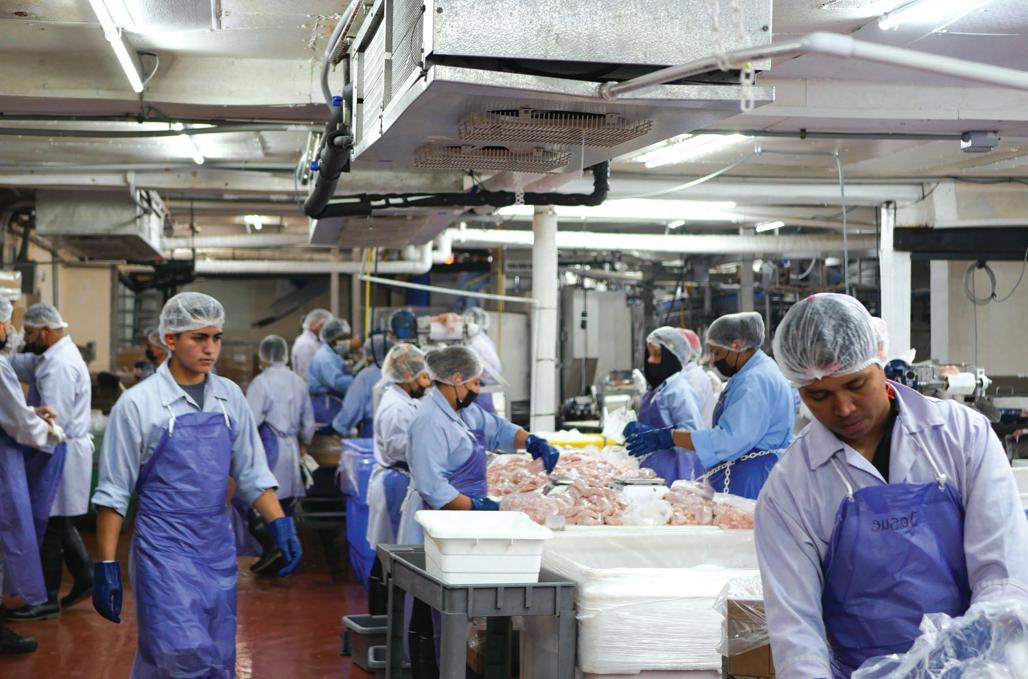

ECO-PACKAGING
Sustainable business practices help minimize the company’s impact on the environment. The bottom line is no junk: They don’t put it in their products, and they don’t leave it in their path. Their new minimum-impact packaging helps to further limit their ecological footprint. The single material packaging is friendlier for the environment than a non-recyclable foam tray. Freshness and taste are sealed in a sturdy sleeve that is freezer-safe. This means no additional waste and also eliminates the risk of contamination through transferring to freezer bags.
HOW TO GET MURRAY’S CHICKEN IN A STORE NEAR YOU
Grocery stores tend to bring in new products based on customer demand. If your preferred local retailer does not currently carry Murray’s Chicken, you can help by filling out Murray’s Retailer Request Form on their website and bringing it to the retailer.
BUSINESS OPERATIONS
Murray’s primarily deals with distributors. Shipping their products to NYC, Northern NJ, Southern NJ/Philadelphia, Baltimore/Washington DC, New England, Florida, Chicago, and upstate New York (Rochester/Buffalo).
PERSONAL PERSPECTIVE
“I wanted to get back to basics—to provide a clean, healthy chicken that I would be proud to serve to my children and grandchildren. In order to achieve these, Murray’s chickens are never administered antibiotics and are fed a vegetable-based diet free of animal fats and animal by-products. Our chickens are grown slowly on small family farms and we were the first in the industry to be given the Certified Humane label which verifies the humane manner in which our birds are raised, transported and handled. When presented with the opportunity to partner with Certified Humane, we jumped at the chance. Certified Humane is consistent with our core value that all animals should be raised with decency and respect. Not only does this result in happier and healthier farm animals, it leads to a higher quality of meat.” – Murray Bresky

Seminary Hill Cidery
The World’s First Passive House Certified Cidery
43 Wagner Lane Callicoon, NY
Doug Doetsch, Proprietor
Specializing In Certified Organic Apple and Pear
Orchard and Cidery seminaryhill.co

ORIGINS
For Chicagoans Doug Doetsch and Susan Manning, Seminary Hill in Callicoon is a homecoming: Doetsch is descended from a Callicoon family, (5 generations) and the couple wanted to give back to the region. The result is a handsome modern building, partially made with wood from the now-demolished Tappan Zee Bridge, with spectacular views from the orchard overlooking the Delaware River Valley. Although Doetsch’s parents on both sides came from farm families, they themselves were not farmers.
Following a career in law, Doug wanted to try to re-establish an orchard and cider culture that had been in Sullivan County in the early 20th Century. They have two apple/pear orchards at Seminary Hill in Callicoon: a 2.5 acre orchard planted 2014-2015 on the Doetsch homestead on Kautz Road and a 10 acre orchard planted 2016-2019 on Wagner Lane overlooking the former St Joseph’s Seminary and the Delaware River. The Kautz Road orchard sits
next to some old apple trees presumably planted by his great-great grandfather on the family farm, established in the 1860s when many German immigrants were moving into western Sullivan County. The Wagner Lane orchard—about 1/4 mile away from the Kautz Road orchard—sits on land that formerly was part of farm maintained by St. Joseph’s Seminary.
Down the road, the cidery’s Boarding House is an enchanting place to tuck in after an evening of cider-fueled revelry. It occupies two classic clapboard buildings, a former hospital and a doctor’s office, and The Old Ross House, a private home across the street. Anna Aberg and Tom Roberts of the Livingston Manor design team Homestedt styled the interiors with a simple Shaker aesthetic: a soothing palette of grays and olives, wooden accents, natural linens, and old prints from a book about New York apples.
COMMUNITY & ECONOMIC IMPACT
Seminary Hill provides a beautiful space overlooking the orchards, with refined and delicious food, for guests to enjoy on a weekend day or evening; a space for multiple events and weddings throughout the year; a place that draws visitors locally, nationally and sometimes internationally to Callicoon. The Doetsches find it very rewarding to be in a beautiful orchard setting; watching trees mature and bear fruit; hosting guests in the tasting room/restaurant; and introducing guests to a beautiful corner of the world. From tours and tastings, arts & cultural programming to cider workshops and ongoing live music and lawn games, there’s always something happening at Seminary Hill.
GROWTH
As the trees mature, they have grown in apple/pear production and now need to buy in very little fruit to make their cider.
Using holistic and organic orchard practices, they produce many cider-specific apple/pear varieties used in their integrated orchard, cidery, tasting
room/restaurant, wedding/event venue and boutique hotel.
CHALLENGES
The variable and inconsistent weather extremes in New York, e.g. our cold, wet and cloudy spring and summer.
GOVERNMENT SUPPORT
Possible easing of organic certification and maintenance requirements by the government would be helpful as the paperwork is very burdensome! More support from government for sustainable energy solutions. More encouragement for farms to innovate with a bias towards sustainability. Lower property taxes would also help.
SUSTAINABILTY
Is CRITICAL to their operation. Seminary’s orcharding practices are 100% holistic and organic. Both their cidery and tasting room are housed in an award-winning Passive House building. They use solar energy for a good part of their power.
NEXT GENERATION
Doetsch would absolutely encourage the next generation to go into farming. His advice to future farmers: Don’t depend entirely on farming economically. Go to college; work somewhere else; save some and then come back to the farm with that knowledge.


Winterton Farms/ Two Farms Brewing
689 Winterton Rd, Bloomingburg, NY 12721
Proprietor: Erika Malmgreen
Specializing in Culinary and therapeutic Lavendar, Syrups, Jams, Small batch beer wintertonfarms.com
ORIGINS
Winterton Farms is a family-owned lavender and maple operation tucked down a long dirt road in Bloomingburg, NY. Erika is entirely self-taught in botanical distillation—her fascination with the process led her to experiment at home, and by 2017 they had planted their first lavender rows. Over time they built out high tunnels for produce, added a push-behind lavender harvester in 2024, and expanded into agritourism with U-pick fields and workshops.
Erika grew up in Wurtsboro but did not meet Kent until she moved back to the area in 2013. He was already farming with his brothers in Bloomingburg when she began working with him on the farm in 2014.
She now serves as Chairwoman of the Sullivan County Agriculture & Farmland Protection Board, advocating for the very farmland she fell in love with.
“Although I’d always thought this region was beautiful growing up, it wasn’t until I started farming that I really understood how fortunate we are to live—and work—in such a special place.”
Their core crops are culinary and therapeutic lavender and maple syrup tapped from their sugarbush. They also grow a variety of produce (tomatoes, peppers, greens) in several high tunnels each season. They don’t keep livestock, but partner with local beekeepers to incorporate honey into their lavender-honey product line.
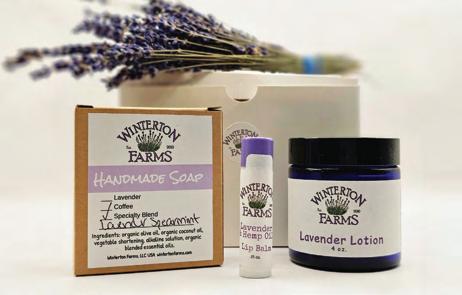
What began as a small botanical-oil side project has pivoted into a full agritourism destination— adding U-pick, distillation workshops, farm-store sales, and in 2024, an on-site brewery partnership.
REWARDS
“Working outside in the dirt is a dream,” says Erika, “Even though farm ownership is a 24/7 job, I relish the freedom to make decisions and show my children the importance of preserving agricultural land. I also love opening our special hidden-in-the-woods space for guests to unplug and experience the fields.”

GROWTH
Winterton Farms saw steady growth through 2019, then paused in 2020 due to shutdowns. Local farmers-market support was incredible, but engagement dipped as things reopened. Since 2024, interest in local experiences has surged again, and strategic partnerships—like with CCE’s Beginner Farmer Program—and collaborations have driven people back to the farm.
As the first lavender farm in Sullivan County, their tucked-away location down a winding dirt road gives a sense of mystery and discovery. The recent addition of an on-site brewery creates a true farm-to-glass experience no one else can match. They take pride in their farm-to-glass approach. Their lavender fields, hop fields and maple trees provide the inspiration and ingredients for their unique brews, creating a harmonious blend of floral notes and maple sweetness that you won’t find anywhere else.
COMMUNITY & ECONOMIC IMPACT
They host a variety of community events year-round— U-pick, sound-healing retreats, artisan markets—and work closely with CCE Sullivan on the Beginner Farmer Program. Those gatherings bring dozens of growers and visitors to the area, boosting local restaurants, B&Bs, and shops.
NEW TECHNOLGY
Winterton is still small-scale: a tractor and, as of last year, a push-behind lavender harvester handles most field work, but almost everything else is hand-harvested. That balance keeps costs down while preserving flower quality. continued...
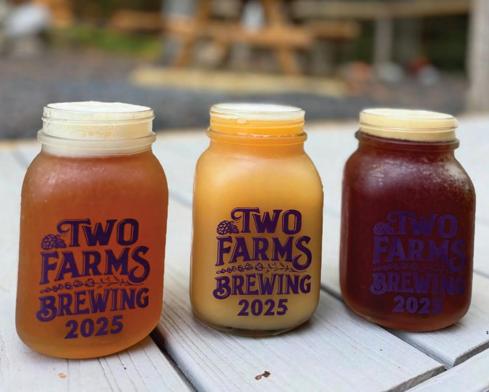
CHALLENGES
Securing the necessary funding to invest in infrastructure and equipment remains their top challenge. Without adequate capital, scaling up—even to meet modest growth—is difficult.
Competing against large-scale lavender and maple producers puts pressure on pricing. Their small-batch, high-quality products command a premium, but shipping and production costs eat into margins.
GOVERNMENT SUPPORT
More low-interest infrastructure loans, streamlined agritourism permitting, and targeted grants for small-scale renewable-energy and equipment purchases would be transformative. Simplifying application processes would help them access those funds more quickly. Locally, the Cornell Cooperative Extension has been an amazing resource to the Malmgreens but having free access to a grant writer dedicated to small-scale ag projects would relieve a lot of administrative burden and help them secure the funding they need.
BUSINESS OPERATIONS
They sell primarily direct-to-consumer through their on-site farm store, U-pick events, local farmers markets, and their online shop (nationwide shipping). A handful of regional boutiques and wellness centers carry their products wholesale. Keeping up with marketing and the
ever-changing social-media landscape is a constant and costly struggle so they focus on storytelling—sharing behind-the-scenes farm life on Instagram and Facebook, sending segmented email newsletters around seasonal events, and securing local media features. Consistent branding across product labels, their website, and on-farm signage reinforces who they are.
SUSTAINABILITY
They follow organic practices (though they’re not certified) and compost all organic waste. On the brewery side, they capture and store all wastewater to irrigate the fields and high tunnels. Spent grain from brewing is given to local farmers to feed livestock, and they partner with nearby small growers—purchasing their produce as ingredients for their value-added products.

PERSONAL PERSPECTIVE
The Malmgreens would lower barriers to entry—making land, capital, and agritourism/ process permits more accessible to new farmers. Easier access accelerates innovation and keeps farmland in active production. Farming offers deep fulfillment through land stewardship and community building but they would encourage the next generation of farmers to learn the business side (financial planning, marketing, diversification) alongside fieldwork. Start with one product or a clear niche. Validate demand before scaling, lean on Extension resources, network with fellow farmers, diversify your revenue streams, and work smarter, not harder so you can focus where it matters most.

Pollinator Spirits
Long Eddy, NY
Owner Claire Marin Bees, honey products, distilled spirits pollinatorspirits.com
GENERAL BACKGROUND
It all began on Christmas of 2003 for Claire Marin with her partner, Cathy gifting her a beekeeping kit. By April of 2010 she knew that she wanted more close contact with nature, agriculture and protecting the beautiful Sullivan County area.
She went up to Sullivan County in 2003 and fell in love with the beauty, space, the river and so many brooks for awesome fishing. She was captivated by bees, their

incredible work ethic, and supportive ways noting that if we ran the world like a hive, we’d be a lot more efficient! She now has two other beekeepers that help her manage the 300 hives to supply restaurants, bars and hotels all over NY.
What also began in 2010 was a big passion for distilling, is now Pollinator Spirits. A complete line of NY State, sustainably made spirits which include vodka, two gins, three whiskeys, and an aperitivo style amaro. They only use local, regenerative farmed, organic/non-GMO grains and do all distillation in-house. The result is beautiful, expressive spirits for which they’ve won several important awards. They are able to ship all over the US right from the website pollinatorspirits.com.
GROWTH
Claire absolutely loves what she does…the bees are beautiful and rewarding. She marvels that there so much still that we don’t know about them and her passion for the farm distillation process is also a huge part of her life. She entered this business when there were only 3 farm distilleries in NYS, now there are 271! That is a lot of support for our farmers and their grain and grapes.
continued...

GROWTH
Marin has seen very healthy growth, and they’ve increased their business specifically in the last year. Consumers want better quality and now understand just how to get it from local distilleries. As a woman-owned company, she’s found great success; producing delicious, expressive spirits, winning awards for each of their products, and attractive bottle design. They don’t take anything for granted. They know what goes in is what makes the spirits so special and so they never compromise quality, always sourcing the best their farmers grow.
COMMUNITY & ECONOMIC IMPACT
Pollinator supports local causes, fundraising efforts, and constantly promotes Sullivan County and the surrounding area. They’ve brought several groups of press up to Sullivan County and hosted them to experience what it is like.
“They [the press] all fall in love immediately!” says Claire, “We have amazing makers everywhere you turn so it’s a pleasure to share with them. We also use local businesses in the way of insurance, maintenance, building materials, law, accounting, banking and more.”
CHALLENGES
One of the biggest challenges is access to markets… as farm distillers they are not allowed to sell at some of the biggest city markets unless they grow their own grains. She adds, “If our local dairy farmers in Sullivan County would be able to get grants to buy equipment to grow more grains, they’d be able to fulfill all the demand for distilling grains. Instead, I have no choice but to get it from the Hudson Valley (malted barley) or Trumansburg (rye, and corn).”
BUSINESS OPERATIONS
Pollinator ships directly to consumers as well as through a distributor. Marketing and branding are done in-house with Marin just recently redesigning their web site herself. “It keeps me on my toes!”, she says “Social media is also imperative to getting the word out.”
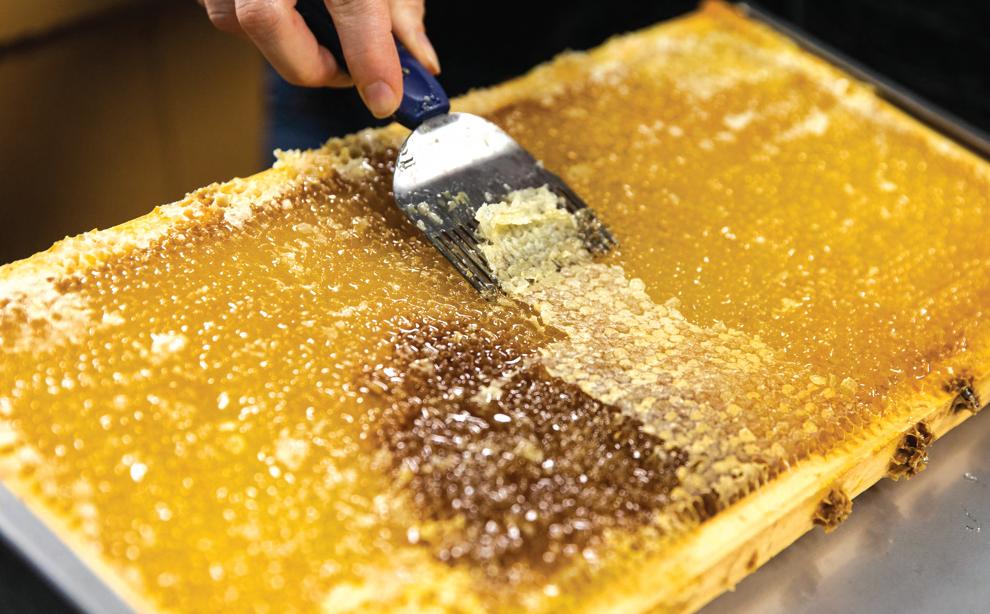
SUSTAINABILITY
It’s at the top of their list when making any decisions. From the grains they use, to the farmer they donate the spent grains to…it is an obsession, and truly necessary for all of us farmers to focus on supporting. They have farmers in the surrounding area, who they know and support by buying their meats, and in return, Pollinator donates their spent grains for them to enhance their feeds. The grains are still full of clean, organic protein and amino acids.
PERSONAL PERSPECTIVE
“If I could change one thing about the agricultural industry it would be to give farmers more financial support. Access to higher learning, education specific to farming for their kids”, says Marin. “I would absolutely encourage the next generation to go into farming. It is the most noble profession, and we don’t always treat it as such.”
ADVICE TO YOUNG FARMERS
Go to school and learn about soil health, water conservation, financial management, renewable energy, and natural pest management using no pesticides. Then return to run the farm. There is a huge demand for naturally farmed local products.
WHAT’S NEXT
Marin is busy trying to keep up with growing demand for her product. Local establishments that serve and feature Pollinator Spirits are: Eldred Preserve, Seminary Hill, Black Walnut, Old Foundation, Toast, La Cigogne, Aspire Brewery, Upward Brewing, Hancock Liquors, Narrowsburg Fine Wines, Cochecton Spirits, Arnold House, WIldflower Farm, Decant, Cottage Wines, Stickett Inn, Valley Rock Inn, Upstate Taco, 52 and Vine, included among the growing list. They are also available at most liquor stores in the area and Marin adds that the biggest way you can support a small distillery is to ask your favorite shop to carry the brand. “When you buy local, you are supporting real people and your immediate community, not a big corporation. If your favorite store doesn’t carry local, ask them! They will listen to you.”
Bashakill Winery
1131 South Road, Wurtsboro, NY
Owner Paul Dennino and Samara Ferris
Specializing in Organic Grapes for Craft-Made Wine, Organic Produce. bashakillvineyards.com

ORIGINS
Paul Dennino had no intention of starting a winery when he first purchased his property, a former boat launch and bait shop along the Bashakill wetlands called Captain Franks in 2001. He already had roots in the Westbrookville area when his grandfather left Brooklyn to move there in the ’4os to start an egg business with his brothers.
For Paul, it all started with that land, a loose plan, and a desire to leave his day job in IT. After a trip to Napa, California he became interested in exploring the wine industry in New York. He learned that he had a special microclimate on his Wurtsboro, NY property from the warm air flowing off the Bashakill Wetlands, which could protect the grapes from the otherwise frigid New York cold climate. The idea for a vineyard was born. Paul began taking seminars at Cornell Cooperative and in 2005, he and his partner Samara Ferris began operating their boutique winery in Sullivan County. They obtained the first farm winery license in Sullivan County in 2007.
GROWTH
After taking his first class in 2005, Dennino has learned from many farmers over the years. When they first opened, the intention was for people to come sample wine and then purchase bottles to go. Over the years the winery morphed into an agritoursim destination area, with gourmet food, (using organic produce grown on-site) live music, re-fillable wine growlers and no single-use plastics.
Being so close to the wetlands, they wanted to grow organically so they had to look for hybrid grapes that were a little more disease resistant to humid weather. Over the years they have planted a few different varieties and until they found the hybrid grapes that could handle disease pressure.
“We have been lucky enough to still be around after 17 years” says Deninno, “It has been a lot of ups and downs but very thankful we have been successful especially over the last 5 years. I think the main reason is we always keep investing back into the business and try to improve things to keep us unique and interesting. There is so much competition around with craft beverages, I believe you must keep things changing so customers have new things to look forward to.”
They now offer local beers, handmade cocktails from local spirits, non-alcoholic cocktails and drinks, as well as a handcrafted menu from their on-site commercial kitchen.
REWARDS
“The most rewarding thing for me is being involved in the harvest” says Paul. “Then two years later, having a finished wine and remembering what that harvest year was like. It’s pretty cool”.
COMPETITION
Bashakill Vineyards is lucky to be a neighbor of the Bashakill wetlands and that alone is such a draw for their patrons. They try to be a very eco-friendly winery with re-fillable wine growlers, no single-use plastics and growing organically. They believe that is what separates them from their competition and draws visitors from not only Sullivan County, but from all over the state with 60 % coming up from the city and surrounding areas.
COMMUNITY & ECONOMIC IMPACT
Being an Agritourism business in Mamakating helps bring in visitors from all over, which ultimately brings business to the Wurtsboro area. The clientele at their adult-only winery is a 60/40 mix of day trips and locals, and since the winery closes at 6 pm –people can go into town and have dinner somewhere else and spend the rest of the evening and spend their money. It amazes Deninno how many people come here to the area for the first time. He says that customers are always asking him for recommendations for places to go and places to eat... so they always pass the local spots along.
Dennino and Ferris also try to help with local fundraisers and help support the Basha Kill Area Association (BKAA) to keep the wetlands preserved and pristine. They use local companies for labor and expansions projects but do most of the work themselves.
TECHNOLOGY
Bashakill uses Geo-thermal technology for storage of their wines besides an underground cave they built in 2011 to house their wine barrels.
CHALLENGES
Micro climate – Since they’re organic, the weather and humidity uncertainties make it very challenging. It’s also costly to fund their own projects – new pavilions, walkways etc.
GOVERNMENT SUPPORT
Dennino has gone to numerous seminars at Cornell, up in Geneva, and he gets his wine tested at the local Cornell lab in Liberty, where he’s involved in the mentor program, mentoring new farmers. He’s currently mentoring a young farmer in Swan Lake who has planted 5 acres of vines, helping him get established. The program involves all different types of agriculture, not just wine.
CCE has been helpful to Deninno, listing upcoming and available grants. Bashakill Vineyards was able to get a matching funds grant through the ESD allowing them to get larger wine tanks this month, so they can up their production this harvest. All the wine they produce has a New York State grown and certified designation, and that’s definitely beneficial to getting some of those grants. “How it works is that we lay out the money and the State reimburses us for half—specifically for upping production in the craft beverage market.” says Paul.
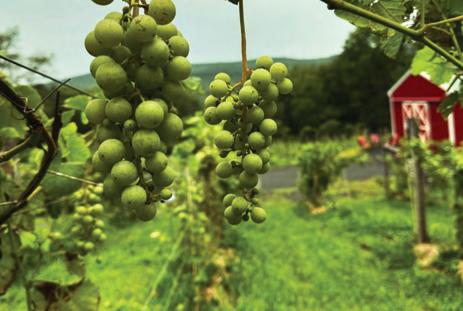
PERSONAL PERSPECTIVE
If he could change one thing about the agricultural industry, Dennino would make it easier for a new business to get started. “If I didn’t start back in 2006- I probably wouldn’t be here. The towns make it very difficult and very expensive for new industries to get off the ground. The amount of engineering required, and the upstart costs are prohibitive to new farms and they could be a little friendlier.







Agrivoltaics: The Future of Farming and Clean Energy in New
York State

By John Cappello, Esq., Partner, J&G Law, LLP

When most people outside of New York think of our great state, they think of large urban landscapes and crowds of people. However, those of us who reside in the Hudson-Valley, while embracing the wonder and diversity of New York City, are lucky enough to live among and experience, a part of the great and rich agricultural history of New York State.
New York is ranked first in the nation for yogurt production, second for apples, maple syrup, cabbage, and snap beans and the third for grape juice and wine. Agribusinesses themselves provide 100,000 plus food manufacturing jobs, with 6.5 million acres of land currently farmed in New York State according to the New York State Empire State Development.
In addition, over the last several years with the help of our Governor’s Office and the NYS legislature “Agritourism” businesses which began with pick your own produce, hayrides, petting zoos, educational tours, and workshops recently expanding to farm wineries, breweries, distilleries, barn wedding venues
and even upscale lodging facilities where people can stay for a time to experience and participate in the farm experience have been developed throughout our state. These efforts have helped farmers, especially smaller non-factory farm operations, supplement their income and allowed future generations to attempt to compete and continue farming in New York.
It now appears that there is a new kid on the block, when it comes to supporting and enhancing agricultural businesses—“AGRIVOLTAICS”—“A new and emerging combination of technologies that enhances climate resilience and allow sustainable food and energy production” as described by New York State Energy

Research and Development Authority (NYSERDA).
In essence, agrivoltaics provides dual use of larger communities or even an industrial scale solar facility to be located in a manner that facilitates agricultural activities such as, farm crop production, livestock grazing, and pollinator habitat in and around the solar field.
There is significant research that demonstrates that the existence of solar panels around and above crop fields can shade and cool the crops resulting in lesser rates of evaporation, decreased irrigation water and reduced stress to the crops. This allows the crops to grow under drought stress, decreases water use and facilitating photosynthesis resulting in longer and more efficient crop growth.
In addition, the solar panels themselves can also benefit from co-location, since the evaporation of water from the crops creates localized cooling, which reduces overheating and can boost solar panel
performance. (See https://esa.org/blog/2019/07/29/ solar-panels-cast-shade-on-agriculture-in-a-goodway). There are similar benefits associated with solar grazing and pollinators.
Agrivoltaics projects in New York State are a win, win proposition that assist the State in meeting its goals to reduce dependence on fossil fuels by generating electricity through solar panels, while preserving agricultural land, providing additional revenue to farm owner/landowners and job creation while providing opportunities for further study on enhancing crop production in our region.
Necessary Steps to Support Agrivoltaics Projects:
1. Local municipalities need to review their existing zoning laws regarding solar to tweak and amend the laws to accommodate the additional requirements. Some of these revisions will allow for increased overall height of the solar raised to allow panels to tract the sun and be placed in 180 degree positions when necessary to maintain or harvest crops under the panel; increase the areas allowed to be occupied by solar rays to allow for larger aisles between the arrays to allow farm equipment access and maintain the farmed area: relax restrictions prohibiting location of solar facilities on agricultural soils, so long as the facility is a dual use agrivoltaics solar facility and any other necessary tweaks to accommodate solar.
2. Preserve federal incentives for solar development that provide farming families with the choice to utilize a portion of their property for agrivoltaics.
3. Continue to support the efforts of NYS and NYSERDA to fund research on the benefits of Agrivoltaics.
The good news is the first agrivoltaics solar facilities in the Hudson Valley are currently under construction, with at least 1 facility scheduled to be fully operational, with hay crop proposed to be harvested by summer 2026. It is up to us to make our voices heard and demand our local, county, state and federal governments continue to support agrivoltaics and the benefits it provides.

Gastronome Packaging: Fueling Local Growth,
One Jar at a Time
In the heart of the Hudson Valley, Gastronome Packaging has quietly become one of the most important engines of growth for the region’s food economy. Specializing in premium co-manufacturing and packaging services for broths, soups, sauces, rendered fats, and specialty items, Gastronome supports a growing network of small food businesses, celebrated chefs, and emerging brands who rely on its expertise to scale and succeed.
Operating a USDA- and FDA-inspected facility designed to bridge the gap between small-batch craftsmanship and commercial production, Gastronome has helped bring dozens of handcrafted products to market without compromising quality, integrity, or the story behind them.
A LOCAL ANCHOR WITH LASTING IMPACT
What sets Gastronome apart is its unwavering commitment to being a local resource first. The company has created hundreds of skilled jobs across operations, food safety, and logistics filled by residents from the surrounding area. By offering competitive wages and long-term employment opportunities, it has established itself as a critical economic driver for the town.
In September 2023, Gastronome’s original building was tragically lost to a fire. But rather than shutting down, the team scrambled and in a matter of 3 weeks restored operations and preserved the jobs and services that so many local businesses depend on. That recovery has become a symbol of the company’s resilience and dedication to the community it serves.
Just as importantly, Gastronome serves as an essential launchpad for small food businesses. Many entrepreneurs lack our USDA, FDA, SQF and Organic Certifications to meet regulatory requirements or scale production on their own. Gastronome provides them with access to top-tier equipment, in-house Chef, and a Thermoprocessing Technician —allowing them to compete nationally while remaining locally rooted.
A RISING FORCE IN THE REGIONAL FOOD ECONOMY
As the food landscape evolves, Gastronome Packaging is playing an increasingly vital role in shaping what’s next. The company is committed to sustainability, innovation, and reducing food waste while expanding access to clean-label, high-quality food products. By acting as a strategic partner to chefs, retailers, and emerging brands, Gastronome is helping to elevate the region’s reputation as a culinary and manufacturing hub.
With demand for its co-packing services increasing 250% over the last 3 years, Gastronome is now seeking support to expand into a new, larger facility. This next phase of growth would allow for the creation of 65 additional jobs, with a Capital investment totaling $4.5 Million.
A SMART INVESTMENT IN THE FUTURE
Gastronome Packaging is more than just a food manufacturer—it is a cornerstone of the local economy and a springboard for the next generation of food entrepreneurs. Investing in its expansion means investing in economic development, workforce opportunity, and the long-term vitality of New York’s food and agriculture sector.
As the state continues to champion homegrown industry and community resilience, Gastronome stands ready to grow—with the mission, infrastructure, and customers to match.

Sullivan County Partnership Grows


A national partnership of leading independent insurance brokers specializing in property and casualty and employee benefits. At AssuredPartners, they focus on relationships. By pooling resources, skills, and knowledge, they work together to achieve a common goal.
Their growing partnership of leading regional and local independent insurance businesses provides trusted advice, support, and strategic guidance, leveraging their combined expertise and resources.
When individuals and organizations come together, they become stronger than they could be alone, emphasizing power through partnership!

@woods is a first-of–its-kind resort, purpose-built for high-growth tech companies. On 130 acres in Bethel, NY they’re developing a private, luxury resort for New York’s most ambitious tech companies. With five-star accommodations embedded in nature, expert-led programming, on-site facilitation, and performance-focused amenities, woods is purpose built to drive breakthroughs.
Created and based in Middletown, NY since 2002, EC Media Group, LLC, is a team of diverse and experienced Hudson Valley, NY graphic designers, photographers, videographers, sound engineers and other creatives with 20+ years combined experience. Owner Everett Collie has put together a team of highly talented entrepreneurs, producing and coordinating both small and larger events from the Ottaway Medal Dinner to the Orange County’s Arts Council Wonderland Event.
He continues to foster an environment developing up-and-coming entrepreneurs in their respected media field. Executive Investor

At EDM, their philosophy is simple: they are Solutions Driven and People Focused. For 37 years, they’ve built a reputation for delivering high-quality and cost-effective MEP, structural and industrial engineering solutions in partnership with their clients. Their team is growing but agile, bringing honesty, innovation and a personal touch to every client. For EDM, engineering is more than calculations; it’s about relationships, trust, and finding the right solutions together. That’s the EDM way.

In the heart of Sullivan County, Gastronome Packaging specializes in premium co-manufacturing and packaging services for broths, soups, sauces, rendered fats, and specialty items. Gastronome supports a growing network of small food businesses, celebrated chefs, and emerging brands who rely on its expertise to scale and succeed. The company has created hundreds of skilled jobs across operations, food safety, and logistics filled by residents from the surrounding area.

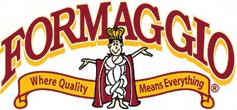
Formaggio brings time-honored Italian cheese specialties to your table with ease and elegance. Known for hand-rolled mozzarella, bold marinated salads, and a full line of charcuterie classics, Formaggio makes it simple to serve something truly special. Every item is crafted with care, using traditional methods and premium ingredients which honor authentic Italian flavor and experience. Whether entertaining guests or enjoying a snack, Formaggio delivers quality you can taste and trust. Taste the Formaggio Difference.

The Niki Jones Agency specializes in the creation of unique, results driven, integrated marketing campaigns that are designed to meet and exceed their client’s expectations. Providing comprehensive marketing solutions, the Niki Jones Agency helps you attain your full marketing potential. “NJA” for short, is a full-service PR, marketing, and advertising agency focused on visual identity and branding and located in Orange County, NY. The Niki Jones Agency is proud to be recognized as a 100% woman-owned business by the State of New York.
VGF Management delivers top-tier, bilingual nearshore outsourcing solutions, helping businesses scale efficiently while reducing costs, providing customized teams that seamlessly integrate with your operations.
Services include: Customer Support & Back-Office Operations—Reliable, high-quality service to enhance customer experience. Sales & Lead Generation—Expert teams driving revenue growth. HR & Recruitment—Fast, hassle-free hiring of top talent. Tech & IT Support – Scalable solutions to keep your business running smoothly.
1900s: Escape the city; fresh farm produced home cooked foods; transportation (by train); fresh healthy air; enjoy the animals and outdoors; help with chores; cool nights and hard cider.
2025: The Cypert Farm has been home for the Skoda family for over 50 years and continues to be an active farm. Their daughter talks about a bed and breakfast or Airbnb when she inherits it.
Agritourism: Then & Now
By Gerald Skoda


Farmhouse tourism, also known as “summer boarding,” was popular among city dwellers (especially from New York City) who sought relief from the heat and grime of the city in the early 20th century. Tourists would pay farmers—mainly in the Catskills and Hudson Valley—to stay in spare rooms, eat fresh food, and enjoy the countryside. These stays were rustic, informal, and often quite affordable.
The Fruit Orchard Farmhouse was located on Cypert Road in Woodbourne. The 200-acre farm was originally settled by the Cypert family in 1847 when Daniel and his family arrived from Germany. With the next generation (August and Elizabeth) the additions were put on the house to accommodate 30 guests.


This was their listing in SummerHomes , a publication of the O&W Railroad in 1905:
Hasbrouck- Fallsburg Station
August Cypert- Fruit Orchard Farm- House accommodates 30, large airy rooms, 100 feet of piazza, fine shade, fresh eggs, butter and milk in abundance produced on the farm; free transportation to season guests; one mile from church; mail delivered twice a day at house. Terms on application.

Anthony and Myrtle continued the agritourism business; adding to their offerings dairy, poultry, sheep, fruit, vegetables and sawmill business —mostly to help diversify and increase income. Luckily, they had plenty of help—three sons and three daughters.
Their home became the summer resort. The family had to move out of their four bedrooms and sleep above the summer kitchen to accommodate their guests. The guests arrived at the train station in South Fallsburg and the boys had to take the team of horses and wagon to pick them up. Everyone had their job entertaining the summer guests with many of the families continuing to visit every year. One room in the farmhouse actually became the birthing room where Myrtle provided midwife services.

“One of the highlights was being allowed to pick vegetables, especially strawberries, under the watchful eye of grandpa.” —remembers Betty Botsford, great-granddaughter of the Cyperts.
As demand, transportation, prices and storage of farm products increased, most farmers chose to specialize in producing a single farm product or two – like dairy and poultry. The Cyperts increased their dairy herd to 35 cows and limited other livestock to small numbers. Lightning and fire destroyed their main barn in 1939. They rebuilt the dairy barn and like many, gave up the farm vacation venue since half the workforce left the farm for jobs in the growing construction trades. Other reasons for the decline of farmhouse tourism include:
• Automobiles becoming more widespread, giving people the ability to travel farther and choose more luxurious or modern accommodations.
• Urban expectations changing: guests began to demand more amenities than a typical farmhouse could provide; seeking more excitement in the form of pools, entertainment, golf courses and casinos.
• Emergence of boarding houses and hotels with electricity, plumbing, air conditioning and kosher kitchens (for Jewish clientele) that began to outcompete family-run farms.
• The rise of commercialized resorts in the Catskills, often built and run by Jewish immigrants who had once been guests or farmhouse owners themselves, taking over the market.
FARMHOUSE TOURISM REVITALIZED AND REBRANDED AS AGRITOURISM
The 2020 pandemic triggered a mass movement of people from NYC to rural areas like the Catskills. With remote work lasting well into 2025, many urban dwellers once again sought space, nature, and fresh air—sound familiar? Quick, scenic drives became the antidote to lockdown fatigue—favored over flights—and this trend continues post-pandemic. People increasingly value local food, educational farm experiences, and authentic outdoor adventures. Instagram-worthy experiences—such as U-pick fruits, cider tastings, tiny house barns—get shared widely, sparking word of mouth and viral attention.
Traditional resorts, barns, and old boarding houses are being revamped into boutique lodgings, tiny house rentals, wellness retreats—fueling agritourism infrastructure. Cornell Cooperative Extension reports there are currently 25 farms that offer Agritourism activities in Sullivan County. Foodies can also visit farms directly to purchase everything from ice cream, organic vegetables, maple syrup to farm raised meats. The first farmers market was begun by Cornell Cooperative Extension in 1995 in Liberty and currently there are 11 Weekend Farmers Markets where consumers can find every farm product grown in Sullivan County and the region.

Farmhouse tourism at the turn of the century has now come full circle in 2025, reborn as modern agritourism where visitors once again seek authentic farm experiences, local food, and rural escape in a tech-driven world.
Events Recap
Summer Quarterly Project Meeting
Over 80 guests joined the Partnership team at the Roscoe Mountain Club in Roscoe, NY for some golf, dinner, networking and a comprehensive presentation of the upcoming and ongoing projects happening in Sullivan County.

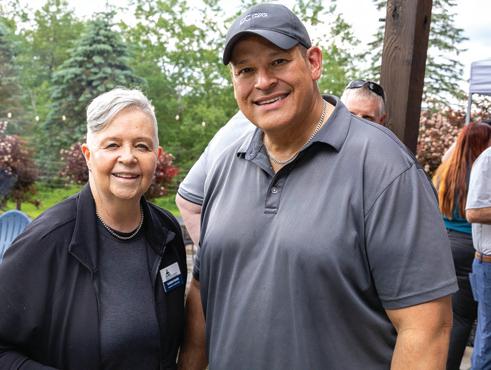


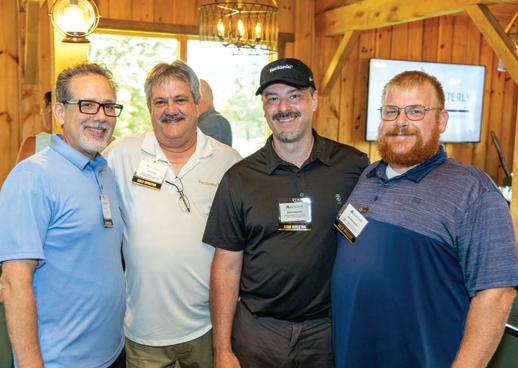

UPCOMING EVENTS
31st Annual Meeting and Awards Dinner
Thursday, October 9 2025 5:30pm -9pm Resorts World Catskills



Scan for Tickets and Sponsorships
Walter A. Rhulen Award: Mike Taylor
President , Combined Energy Services
Owner/Operator, Holiday Mountain Ski Area
Distinguished Service Award: Kevin McLaren
Commercial Banking Market/President Hudson Valley Credit Union
Annual Holiday Party: Thursday, December 11
Location: TBD


INNOVATION,
For decades, Catania, Mahon & Rider, PLLC has empowered the region’s businesses with practical, results-driven legal solutions.
From construction and development to nonprofit guidance, our seasoned attorneys are trusted allies in every stage of your growth.
CONTACT US
Address: 641 Broadway,Newburgh, NY 12550
Phone: 845-565-1100
Website: cmrlaw.com
Email: mcatania@cmrlaw.com
Engineering For Public Heath
Our professional and technical staff of more than 75 engineers, scientists, planners, and technicians are each responsible for the well-being of our clients, our communities, and each other.
Potable water is our planet’s most precious resource, and Delaware Engineering, D.P.C. is committed to engineering every aspect of its safe provision.





• Potable and Process Water
• Wastewater Collection and Treatment
• Stormwater Inflow and Infiltration (I&I)
• Hydraulic Modeling
Permitting and SEQR/NEPA
Electrical and Control Systems
• Community Planning
Public and Industrial Buildings Specializing in custom solutions for Municipal Infrastructure:

Nurturing Health, Community, & Sustainability:
The Transformative Power of Thanksgiving Farm® at The Center for Discovery
The Center for Discovery’s (TCFD) Thanksgiving Farm—established in 1990—is nestled in the heart of Sullivan County, New York, and is the centerpiece of the organization’s commitment to using food as a foundation for health and well-being. More than a farm, it is a living example of what happens when food, care, and community come together with intention.
FOOD FIRST: THE CORE OF THE CENTER’S CARE
At The Center for Discovery, we believe Food is Medicine® — a belief that shapes every aspect of care for the 1,200 children and adults with complex conditions who we serve. Thanksgiving Farm lies at the center of that philosophy, growing nutrient-rich, organic food that fuels healing and daily life across our many campuses in the county.
Spanning more than 300 certified organic and Demeter Certified Biodynamic® acres, the land— also including areas like Stonewall Preserve, Sweet Hill, and Tutto Bene—is cultivated using regenerative, earth-honoring practices that focus on soil health, biodiversity, and sustainability. Under the leadership of Chef Cesare Casella, Chief of our Department of Nourishment Arts® (DNA) – Food and Farming, our team ensures that everything grown here supports not just the body, but the whole person.
In 2024 alone, Thanksgiving Farm produced:
• 42,000 heads of garlic
• 21,000 pounds of potatoes
• 22,000 pounds of winter squash
• 27,000 ears of sweet corn
• 13,000 pounds of tomatoes
• 13,000 pounds of apples and pears
This harvest—and others before and after it— supports the preparation of more than 1,900 meals each day. And every bite matters. These meals are part of customized nutrition plans, created by registered dietitians trained in medical nutrition therapy and deeply integrated with each individual’s health, sensory, and behavioral needs.

SEED TO BELLY®: HOW WE NOURISH INDIVIDUALS IN OUR CARE
Thanksgiving Farm is more than a food source— it’s where our Seed to Belly philosophy was born. We have seen firsthand that food has tremendous power to support health and healing. We also know the importance of connecting people to where food comes from—and making sure that food actually provides the nourishment it’s intended to. That’s why our Department of Nourishment Arts works closely with farmers, chefs, and dietitians to ensure that each step—from seed selection to food preparation— prioritizes quality, engagement, and care.
This philosophy helps even our most selective eaters gradually transition to whole, plant-based foods - often a major milestone for individuals with autism or other sensory processing conditions. Our team monitors everything from mealtime behaviors
to food aversions, creating a full-circle support system where food doesn’t just land on the table—it supports whole-body transformation and healing. And we have the data to back it up.
Across the board—compared to both the national population of typically aging adults and the statewide population of individuals with disabilities—the adults in our care have significantly lower rates of chronic disease, such as diabetes, cancer, and obesity. People are thriving here at The Center. If we can extend the healthspan for some of the most medically complex individuals, just imagine what we can do for the overall population.
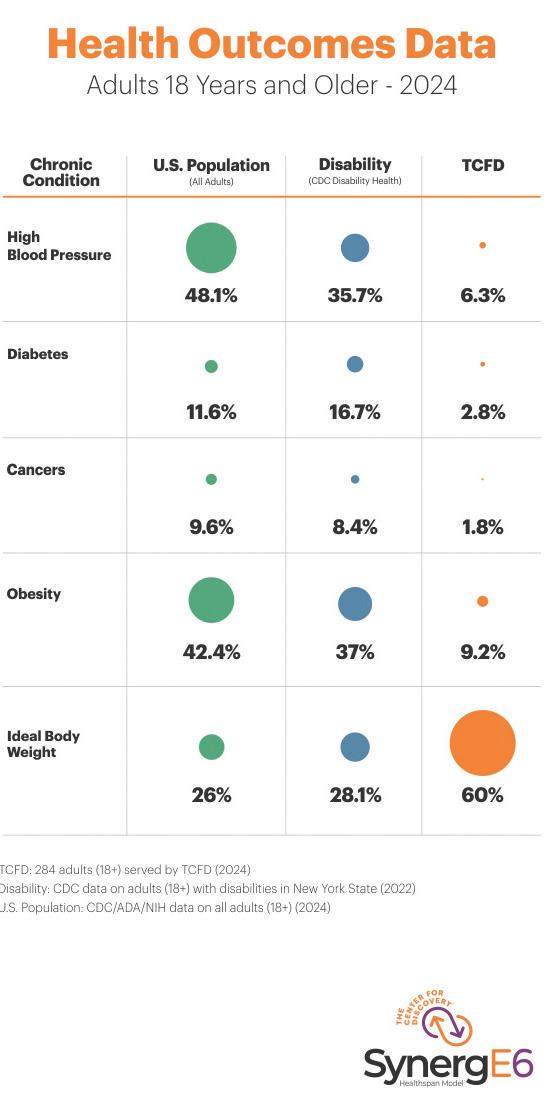

LEARNING ON THE LAND: A GREEN CLASSROOM
Beyond nutrition, Thanksgiving Farm is often referred to as a dynamic classroom where students and residents develop skills, confidence, and purpose in their daily lives. For many, the farm is a calming and structured environment that supports learning in ways traditional classrooms cannot, and connects individuals to a sense of routine and belonging.
Children gain sensory, motor, and social skills through planting, harvesting, or simply walking through the rows of vegetables. The joy of pulling a carrot from the soil or preparing herbs for the kitchen offers a tangible sense of accomplishment.
In our adult programs, individuals care for livestock, learn agricultural techniques, and contribute to the farm’s daily operations. These experiences provide a sense of responsibility and build pathways toward greater independence and personal fulfillment.
Thanksgiving Farm’s reach is felt even further through innovative, hands-on programs that combine tradition with therapeutic value:
Herbal Workshops: In on-campus healing gardens and workshops, students and residents grow and process herbs into teas and spices —learning about plants and their uses while engaging their senses and creativity.
Acetaia del Sole: Our small-batch vinegar workshop produces health-forward apple and fennel vinegars using traditi onal Italian techniques, adding unique flavors—and therapeutic benefits—to our food program.
Sweet Hill Creamery: Launched in 2024, our goat farm and creamery produces fresh chevre, feta, and ricotta with the help of residents who care for the animals and assist in cheesemaking—an incredibly meaningful hands-on experience.
ALL THE WAY FROM THE CENTER’S FARM TO THE COMMUNITY
While Thanksgiving Farm’s top priority is nourishing those at The Center, its impact extends into the wider Sullivan County community in meaningful ways.
COMMUNITY SUPPORTED AGRICULTURE (CSA)
Each season, The Center’s CSA program offers shares of fresh produce to staff, families, and community members. This provides the county (and beyond) with access to nutritious, real food while forming deeper connections between the farm and our local community.
SUPPORTING OUR STAFF AND THEIR FAMILIES
Our work at The Center reaches the kitchens and tables of our 1,800 staff members, too. Many choose to join our CSA at a subsidized rate, bringing home the same fresh, nutrient-rich food we grow for the individuals in our care. Our shared philosophy, from our SynergE6 model to our daily food practices, allow staff to take what they learn here and bring it into their own homes, helping their families eat and live well.


A SINGLE BITE PARTNERSHIP
We proudly donate a full CSA share each year to A Single Bite, a local nonprofit that works to combat hunger and promote food education in Sullivan County. Our collaboration also includes hosting their Real Food Education Program, recently welcoming students from Monticello Central School District to the farm for a week-long immersive learning experience. From greenhouses to goat barns, these students saw firsthand the care and intention behind growing real food—and left empowered to make healthier choices in their own lives.
SULLIVAN 180’S SCHOOL NUTRITION ACTION COALITION
As proud partners in this county-wide coalition, we’re working alongside schools and organizations to bring two free, plant-based meals to every student in Sullivan County. It’s a mission that aligns closely with our core belief that healthy food changes lives.
INNOVATION ROOTED IN TRADITION
4-H Club: Established in 2022, our 4-H students have earned awards at county fairs, practiced public speaking, and taken on leadership roles. It’s another way we support confidence, responsibility, and community engagement.
WHAT HAPPENS HERE, MATTERS EVERYWHERE
Thanksgiving Farm is where nutritious food, learning, and support come together to help people live healthier, more connected lives—and it highlights what’s possible when we treat food as a catalyst for healthy living. Every day, the farm feeds hundreds of people at The Center—but what we’re doing here has bigger meaning. If we can make this work, maybe others can too.
At The Center for Discovery, we’ll keep planting, harvesting, and learning—because every seed, every meal, every moment on this farm matters, and we hope to share it with so many others.
To learn more about The Center for Discovery, please visit: thecenterfordiscovery.org
For more on The Center’s Seed to Belly approach:











• Process Piping
• Pipe Prefabrication
• Plumbing
• Heating/Ventilation/Air-Conditioning
• High Purity Orbital Welding
• Clean Room Pipe Prefabrication
• Institutional Lab Plumbing
• Data Center HVAC
• Design/Build Assist
• BIM/Virtual Design/3-D Drafting
• QA/QC
• Service/Repair/Maintenance


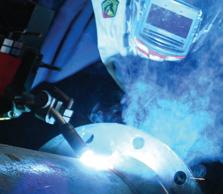














Tax Incentives for Farmers in New York State


By Jonathan F. Rouis Partner — RBT, CPAs LLC
What would New York be without its farmers and farm businesses? Much of the state’s tourism sector and economy relies on agriculture and the farmers who work day and night to keep the industry strong. But, as anyone who has experience in the industry knows, farming is anything but easy. Operating a farm requires endless labor, financial investment, and planning. On top of that, farmers deal constantly with a range of challenges including weather events, diseases and pests, high costs of equipment, and labor shortages, to name just a few. To survive in the business of farming, you need to be resilient—but you also need support. New York recognizes the critical role that agribusiness plays in the state’s economy, and because of that it offers various tax incentives to support farmers
and their businesses. Here are just a handful of the tax credits, exemptions, and modifications available to farmers in New York.
TAX CREDITS
Farm Workforce Retention Credit: Farm employers and owners of farm employers with an eligible farm employee (employed at least 500 hours) may qualify for a credit of $1200 per employee.
Investment Tax Credit: Eligible farms that place qualified property (i.e., machinery, buildings, or equipment) into service during a tax year may qualify to claim 20% of the cost.
Farm Employer Overtime Credit: New as of 2024, eligible farmers who pay their employees eligible overtime may be entitled to this credit.

Alcoholic Beverage Production Credit: Farmers who are registered distributors of alcoholic beverages and produce a certain amount of beer, cider, wine, or liquor in New York during the tax year may be eligible for this tax credit.
Conservation Easement Credit: Farmers who own land that is subject to a conservation easement that is held by a public or private conservation agency may be entitled to this refundable credit.
Excelsior Job Program Tax Credits: Agricultural operations in New York that create at least five new jobs may be eligible for Excelsior jobs tax credits, investment tax credits, research and development tax credits, real property tax credits, and childcare services tax credits.
PROPERTY TAX EXEMPTIONS
Depending on the local taxing jurisdiction, property tax exemptions may be available for farmers for new or reconstructed farm buildings and increases in
assessed valuation on historic barns. Farmers may also be eligible for property tax relief through an agricultural assessment.
SALES TAX EXEMPTIONS AND REFUNDS
Farmers and commercial horse boarding operators are exempt from paying state and local sales and use taxes for certain purchases. These purchases include farm machinery, equipment, supplies, computers, certain vehicles, building materials, certain services, and utilities used in farm production or operation. Farmers and commercial horse boarders can also apply for a refund of sales tax paid on motor fuel and highway diesel motor fuel used in farm production or operation.
TAX MODIFICATIONS
Farmers or farm businesses with less than $250,000 in net farm income may be able to subtract 15% of that income included in federal adjusted gross income.
CONCLUSION
These are just a sampling of the economic incentives available to farm businesses in New York (not an exhaustive list). To learn about other financial resources and opportunities for farmers through the State, you can visit the Department of Taxation and Finance website or—better yet—speak with a local Certified Public Accountant for personalized guidance.



















Board of Directors
Michael Zalkin, Chair
James Bates, Vice Chair
John Brust, Treasurer
Steven Vegliante, Secretary
Jerry Dunlavey
Karen Fisher
Amanda Gesztesi
Anthony Griffith
Kelsey Hornicek
Brittany Johnson
George Kinne
Kevin McLaren
Bobbi Scroggin
Gary Silver
Gerald Skoda
Fred Stabbert
Charlotte Van Horn














Ever Wonder Where Our Investors are Located?
From Livingston Manor, NY to New Windsor, NY — they’re not just from Sullivan County! Each issue, we’ll be calling out members from all over the map.
1 A.W. Griffith Transportation Consulting awgriffithtransconsultny.com
Tel: 347)-623-6314
PO Box 489
White Lake, NY 12786
2 Altman Land Construction Corp
Tel: 908-770-8283
106 Jefferson Street Monticello, NY 12701
3 Birchwood Lodge, Inc.
Tel: 845-436-5159 PO Box 482
Woodridge, NY 12789
4 Jacktown Pest Management LLC jacktownpestmanagement.com
Tel: 845-428-5086 PO Box 538
Livingston Manor, NY 12758
5 Lerner Pavlick Realty
Tel: 845-794-1900
PO Box 472
Monticello, NY 12701
6 Luzon Environmental Services luzonenv.com
Tel: 845-434-7805
1246 Glen Wild Rd Woodridge, NY 12789
7 Majek Furniture majekfurniture.com
Tel: 845-796-4800
312 East Broadway Monticello, NY 12701
8 Sullivan County Board of REALTORS®, Inc. sullivanbor.com
Tel: 845-794-2735 548 Broadway Monticello, NY 12701
9 TD Bank td.com/us/en/commercial-banking
Tel: 845-220-2801
555 Hudson Valley Ave, Suite 105 New Windsor, NY 12553
10 The Center for Discovery, Inc. thecenterfordiscovery.org
Tel: 845-707-8506
PO Box 840 Harris, NY 12742
11 Town of Liberty townofliberty.org
Tel: 845-292-5111
120 North Main Street Liberty, NY 12754
12 Town of Thompson thompsonny.gov
Tel: 845-794-2500
4052 Route 42 Monticello, NY 12701
13 Villa Roma villaroma.com
Tel: 845-887-4880
356 Villa Roma Road
Callicoon, NY 12723
14 Whitbeck Building & Design, Inc.
whitbeckbuilding.com
Tel: 845-421-2720
449 E. Main St
Middletown, NY 10940
15 WM Security Services www.wmsecurityllc.com
Tel: 845-615-9272
26 Scotchtown Avenue Goshen, NY 10924






